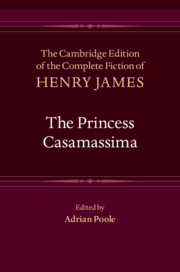Book contents
- Frontmatter
- Contents
- List of Illustrations
- Acknowledgements
- List of Abbreviations
- General Editors’ Preface
- General Chronology of James’s Life and Writings
- Introduction
- Textual Introduction
- Chronology of Composition and Production
- Bibliography
- The Princess Casamassima
- Glossary of Foreign Words and Phrases
- Notes
- Textual Variants I: Substantive Variants up to Copy Text
- Textual Variants II: Substantive Variants after Copy Text
- Emendations
- Appendix: Preface to New York Edition
XXVI
Published online by Cambridge University Press: 11 April 2021
- Frontmatter
- Contents
- List of Illustrations
- Acknowledgements
- List of Abbreviations
- General Editors’ Preface
- General Chronology of James’s Life and Writings
- Introduction
- Textual Introduction
- Chronology of Composition and Production
- Bibliography
- The Princess Casamassima
- Glossary of Foreign Words and Phrases
- Notes
- Textual Variants I: Substantive Variants up to Copy Text
- Textual Variants II: Substantive Variants after Copy Text
- Emendations
- Appendix: Preface to New York Edition
Summary
“Of course he may come, and stay as long as he likes!” the Princess exclaimed, when Hyacinth, that afternoon, told her of his encounter, with the sweet, bright surprise her face always wore when people went through the form (supererogatory she apparently meant to declare it) of asking her leave. From the manner in which she granted Sholto's petition — with a geniality that made light of it, as if the question were not worth talking of, one way or the other — it might have been supposed that the account he had given Hyacinth of their relations was an elaborate but none the less foolish hoax. She sent a messenger with a note over to Bonchester, and the Captain arrived just in time to dress for dinner. The Princess was always late, and Hyacinth's toilet, on these occasions, occupied him considerably (he was acutely conscious of its deficiencies, and yet tried to persuade himself that they were positively honourable and that the only garb of dignity, for him, was the costume, as it were, of his profession); therefore, when the fourth member of the little party descended to the drawing-room Madame Grandoni was the only person he found there.
“Santissima Vergine! I’m glad to see you! What good wind has sent you?” she exclaimed, as soon as Sholto came into the room.
“Didn't you know I was coming?” he asked. “Has the idea of my arrival produced so little agitation?”
“I know nothing of the affairs of this house. I have given them up at last, and it was time. I remain in my room.” There was nothing at present in the old lady's countenance of her usual spirit of cheer; it expressed anxiety, and even a certain sternness, and the excellent woman had perhaps at this moment more than she had ever had in her life of the air of a duenna who took her duties seriously. She looked almost august. “From the moment you come it's a little better. But it is very bad.”
“Very bad, dear madam?”
“Perhaps you will be able to tell me where Christina veut en venir. I have always been faithful to her — I have always been loyal. But to-day I have lost patience. It has no sense.”
- Type
- Chapter
- Information
- The Princess Casamassima , pp. 266 - 271Publisher: Cambridge University PressPrint publication year: 2020

